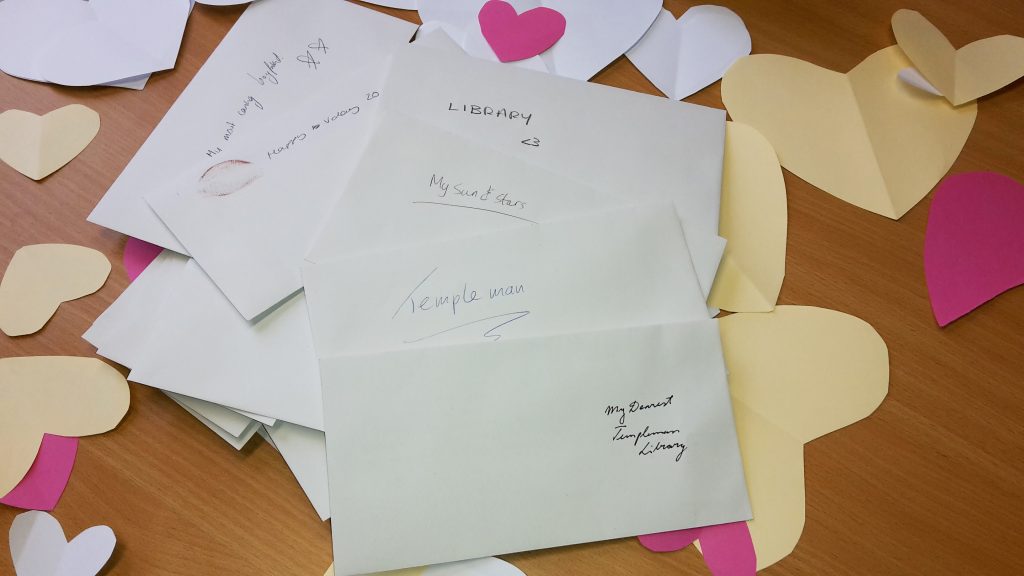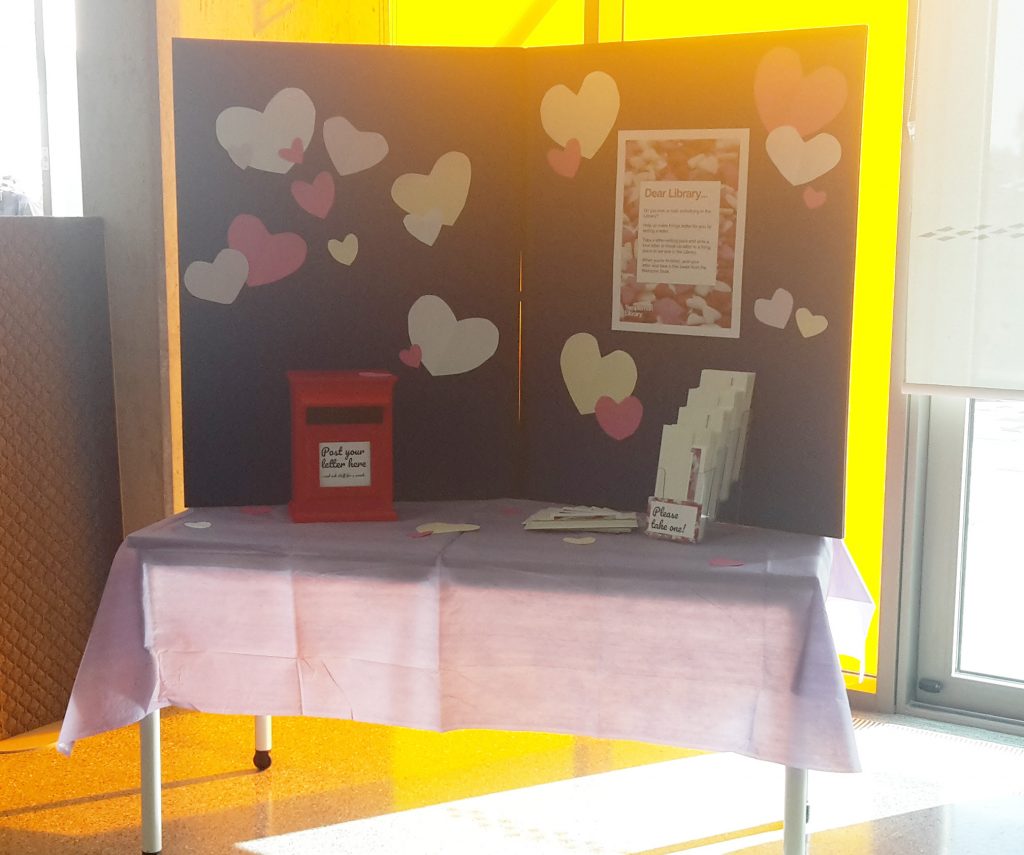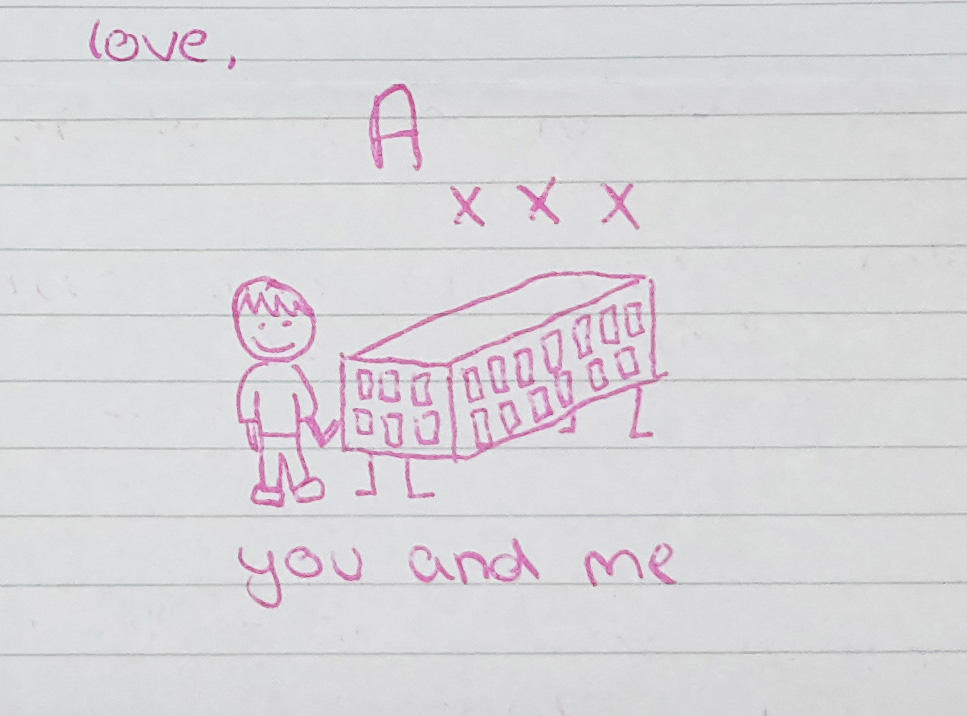
To coincide with Valentine’s Day, we invited Templeman Library users to write a love or break-up letter to the Library.
When? Monday 13 – Friday 17 February 2017
Where? Near Welcome Desk in Templeman West and Help Point in Templeman East
What? Stands with:
- Poster
- Envelopes containing writing paper and guidance sheet
- Postbox
- Heart decorations
Who? Open to all, but we guessed it would be mostly students engaging with it, and the letters we received support this.
How? Students took an envelope, wrote a letter, posted it in the box, and got a sweet from the Welcome Desk or Help Point.
Why? Writing love and break-up letters is a tested UX (User Experience) technique, and Valentine’s Day was a good opportunity to try it out. We asked for general feedback rather than asking about a specific aspect of our service.
We decided to keep it simple by just asking students to write about/to the Library, and didn’t mention IT Services – but some letters did include IT services found in the Library, like WiFi and printing.

Results
We received 30 letters over the week: 14 in West, 16 in East. Most of them (16) came on Valentine’s Day itself.
Some of the letters were a single line and others got into the spirit of the exercise, like this one which included a picture:

Take 10 minutes to read the letters
We want all IS staff to read the letters in full – there are only 20 and they’re short. Much like personas, they tell the real human story of the impact of our services.
Themes and comments
If you’re involved in projects or services related to these areas below please read the relevant letters – and if you can, print them out and display them in your office.
Books and online resources
- Letter 4 (e-resources) , Letter 15 (not enough books) ; Letter 20 (book club)
- Dislikes: Not enough books; Books are hard to find; Invalid links to online resources.
- Requests: Can we have more books for Politics & International Relations? Can we have a Book Club? Can we have a ‘Genre of the Month’ (like LGBT authors for February)? Can we get people to write book reviews? Can we encourage recreational reading?
Borrowing
- Letter 1 (Haiku) , Letter 8 (fines), Letter 14 (recalls) , Letter 15 (recalls, self service)
- Likes: Love the self-service machines.
- Requests: Can we have email receipts for returned books? Please be more lenient with fines over the Christmas period.
- Dislikes: Don’t like fines; It’s too hard to recall books; Don’t like that books get recalled after a few days (because there aren’t enough); Returning books not in social area is long.
Facilities
- Letter 3 (whiteboards) , Letter 10 (accessibility) ; Letter 19 (chairs)
- Requests: Can we have a communal kettle in Templeman East? Can we have more whiteboards? Improve accessiblity. Can we have more adjustable chairs (new West, 3E silent PC room)?
- Likes: Likes that the toilets are clean.
- Dislikes: Don’t like that people with no obvious disability use disabled toilet; Revolving door signs make it awkward and confusing for people who need the accessible door; Grimond door is locked too early; Lifts are slow and cumbersome; East external lift is out of order.
Food
- Letter 1 (Haiku) , Letter 2 (keep food!) , Letter 12
- Likes: Food is allowed; Hot food is not allowed; Study Environment Team enforce hot food rules.
- Dislikes: Smells from neighbour’s food; Can we have space to eat hot food, maybe cafe area or reception? Caffè Nero drinks not allowed.
IT
- Letter 3 (putty) , Letter 4 (WiFi) , Letter 6 (WiFi) , Letter 12 (computers)
- Dislikes: Printing could be easier; Computers take too long to log in; Problems with WiFi; WiFi is slow – takes too long for Moodle to load; SPS students: Putty & XMING don’t always work; Dislikes broken links to e-resources.
Opening hours
- Loves 24/7 opening (x2); Loves opening hours.
Study environment
- Letter 5 (removing stuff) , Letter 1 (Haiku) , Letter 12
- Likes: Noise level is ok on Floor 3 East.
- Dislikes: Removing abandoned possessions distracts other users; Silent areas are noisy
Study space
- Letter 3 (development) , Letter 11 , Letter 14 (noise and seating)
- Likes: It’s a space to work (x2); There’s usually space; Favourite seat on Floor 3 East is usually available; Silent spaces; New Eliot PC space; New development (x2); Cubicle spaces in East; Study carrel.
- Requests: Can we have more seating?
- Dislikes: Development taking too long; Looking forward to development finishing; Not enough space (please finish development) (x2); Want study cubicles in the West; Always overcrowded.
Welcome Desk / Staff
- Letter 1 (Haiku) , Letter 16 (staff are awesome!) ; Letter 17 (carrels)
- Likes: Good service overall; Friendly/kind/helpful staff (5); Likes that the Library is committed to accessibility; Thank you to staff!
- Requests: Can carrel users have more info about who to contact with problems?
Wellbeing
- Letter 20
- Likes: Library projects, like self-care.
- Requests: Can we have free fruit in exam season?
Café
- Letter 4 , Letter 6 , Letter 9 ,
- Likes: like that there’s food and drink available in the Library;
- Dislikes: Too expensive; Not enough vegan options; Closes too early on Saturdays;
- Requests: Want to buy a hot drink after 17:00 at weekends.
What next?
- We may want to do further research around some of the issues raised.
- We’ll be working with our UX Community of Practice members to chat about how their teams can use the data.
- We’ll reply to students who left their contact details.
- As a follow up, we’ll publish an online response to the individual requests and the general feedback. We want to publicly show how we’ve considered each request and share what we decided to do (or not do).
You can view all the comments and letters on the IS UX SharePoint site (Kent staff only).
What we learnt about the technique
Maximise sweets
We found it worked best to have the bowl of sweets visible but not reachable. If students asked if they could have one, we could say “If you write us a letter.”.
Check academic calendars
When we ran it, it was reading week for many students, so the Library was less busy than usual.
Broad brush
We ran this as a self-led exercise and we asked about the whole Library service, so we didn’t get indepth details about specific aspects of the Library.
If this technique is workshop-led and you ask about a specific service, you get longer and more detailed feedback. The responses can help you get to the heart of which aspects of a particular service are either delightful or frustrating to use.
